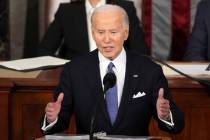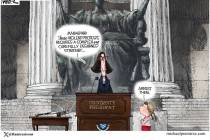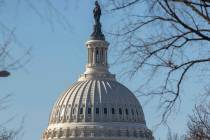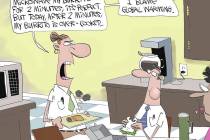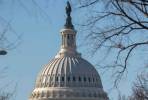Sandoval, Rory aren’t alike on taxes
Brian Sandoval and Rory Reid have been ridiculed by much of the political and pundit classes for refusing to back tax increases. In taking the identical position that the state's next budget should be balanced solely through spending cuts, Nevada's leading gubernatorial candidates have abdicated leadership and ensured their irrelevance in the 2011 legislative session, the criticism goes.
Sandoval, the Republican nominee, and Reid, the Democratic nominee, have insisted that their positions are not rooted in election-year expedience, that they truly believe tax increases will cause more damage to Nevada's battered economy and that state government must be scaled back to weather the downturn.
Their resolve has fed the assertion that voters don't have much of a choice between them.
But Sandoval and Reid do not have duplicate positions on tax increases and the budget for the 2011-13 biennium. They're different in a way that no one -- not even the candidates themselves -- is talking about.
Sandoval says that if elected governor, he'd veto any budget bill that includes tax increases.
Reid, meanwhile, won't say what he'd do if tax hikes were passed.
It is a significant distinction -- as consequential as the governor supporting or not supporting tax hikes in the first place. Whether Nevada's next governor holds a strong veto threat over lawmakers' heads will shape the timeline of the 2011 session and the lengths that legislators will go to pass more record tax increases.
This is not an exercise in speculation or political science. Regardless of how November's election plays out, Nevada history will repeat itself in 2011.
Twice in the past seven years, Nevadans have seen the Legislature pass massive tax hikes. In 2003, lawmakers knew Gov. Kenny Guinn would sign whatever tax hikes they came up with. In 2009, legislators knew Gov. Jim Gibbons would veto their spending plan, and that they'd have to override that veto. Guinn's announced intention to sign and Gibbons' promise to veto compelled lawmakers to go about their business in very different ways.
Before I explain how this relates to the Sandoval-Reid race, understand that the governor's role in enacting tax increases is largely procedural. Neither Sandoval nor Reid will have the power to prevent lawmakers from raising taxes on his own. Thanks to a constitutional amendment approved by voters in 1996, tax increases can't be passed by the Legislature with a simple majority vote. The Assembly and the Senate each must obtain two-thirds support -- the same two-thirds supermajority required to override a veto.
Simply put, if lawmakers have the votes to pass tax increases, they have the votes to override, and they don't need the governor's signature.
This fact, by itself, makes it incredibly foolish for any gubernatorial candidate to campaign in favor of tax increases. Why commit political suicide when your promise is out of your hands? Even Guinn wouldn't talk about raising taxes when he ran for re-election in 2002 -- he presented his plan for higher taxes after voters returned him to Carson City.
The biggest obstacle lawmakers face in raising taxes is the calendar. The governor has five days to issue a veto during a regular session. If lawmakers wait until the very end of a session to pass a budget with tax increases, the governor can exercise his veto after adjournment, which automatically delays the override vote until the beginning of the next regular session -- almost two years later.
Because the governor, not the Legislature, controls the agenda of special sessions, lawmakers who want to raise taxes over a veto have a powerful incentive to work quickly and not get too greedy. They have to pass tax increases at least six days before adjournment to guarantee themselves an immediate opportunity to override.
This is exactly what happened last year. Gibbons promised to veto tax increases, and he reminded lawmakers of his threat frequently. The nearly $1 billion in tax increases lawmakers passed were disastrous, but at least the Legislature got its business finished on time and didn't trample the state's constitution -- like it did in 2003.
Knowing that Guinn would call them back into special session as many times as needed to pass tax hikes, lawmakers held the public schools budget hostage, dragged their work into the next fiscal year, hammered the holdouts among them and created a constitutional crisis. The Nevada Supreme Court eventually ordered that tax hikes be passed with a simple majority vote. (Ironically, Sandoval played a part in that catastrophe, filing suit against the Legislature as Guinn's attorney general.)
If Reid won't veto tax increases, it could embolden majority Democrats to dig in their heels and take the 2011 session into overtime, where 2003-style shenanigans could unfold. Sandoval's firm promise to veto tax hikes, meanwhile, sets the stage for a repeat of 2009.
I called Reid's campaign spokesman, Mike Trask, three times last week to find out what the Democrat would do if he were elected governor and the Legislature passed tax increases. After each of the first two calls, Trask assured me he would have an answer in short order. He didn't answer the third call Thursday morning, and he failed to respond to my message by Friday afternoon.
Can you see a Democratic governor vetoing a budget created and passed by Democratic majorities in the Senate and Assembly? I can't, either.
The fact that my simple question sent the Reid campaign scrambling into its bunker makes me question whether Reid genuinely opposes tax increases, or whether he'll try to have it both ways by working his way into the capital's back rooms to help broker a budget deal that has "revenue enhancements."
If you say you're opposed to school vouchers, you veto any legislation that creates them. If you say you're opposed to tax increases, you veto any legislation that raises taxes.
Sandoval and Reid are definitely not the same when it comes to tax increases.
Glenn Cook (gcook@reviewjournal.com) is a Review-Journal editorial writer.









